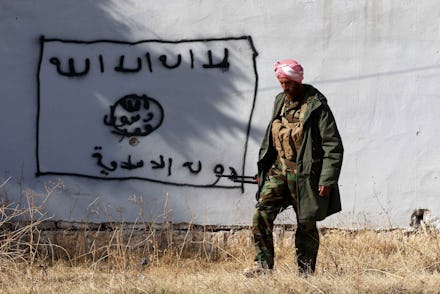The Real Enemy Is the ISIS Propaganda Machine — To Win, the U.S. Must Beat It

The "Pass the Mic" series showcases voices, perspectives and ideas that spark interesting conversations.
A cage of prisoners lowered into a pool and filmed underwater as they drown. An explosive wire detonated around the necks of kneeling men, splitting heads from bodies, the decapitations replayed in slow motion. Prisoners locked in a car and incinerated by a rocket-propelled grenade, their screams audible as the vehicle burns.
The Islamic State group always has new ideas for snuff movies.
But before the internet and social media, we rarely saw terrorist atrocities. Now, the Islamic State group, also known as ISIS, ISIL or Daesh, forces its massacres and executions upon us. Even if we choose not to look, the links and embedded videos are everywhere, a sea of pixelated blood that broadcast religious barbarism.
Yet our leaders, especially President Barack Obama, have underestimated the power of this relentless flow of violence to turn non-Muslims against Islam. The anger has risen for two years, and after the attacks in Paris and San Bernardino, California, it is boiling over.
Criticizing Republican presidential candidate Donald Trump for his proposal to ban Muslims from the United States is easy — and necessary. But this fury is not confined to one party, or one country. Two weeks ago, in France, the far-right National Front led all parties with 30% of the vote in regional elections.
ISIS knows what it is doing. Its propaganda strategy is two-pronged: Recruit Muslims and provoke the West. It is winning both ways. The Sept. 11, 2001, attacks were far deadlier than the recent shootings, but public response this time around has been far greater.
As a novelist who writes espionage thrillers featuring an American convert to Islam, I spend a lot of time thinking about the uses of narrative as well as the relationship between the West and Islam. At this point, the Islamic State group as a territory-holding organization exists mainly to spread propaganda.
ISIS sees itself that way. "Senior media operatives are treated as 'emirs' of equal rank to their military counterparts," the Washington Post reported after investigating the militant group's propaganda machine last month. "They are directly involved in decisions on strategy and territory."
A defector told the Post, "The media people are more important than the soldiers." In 30 days this summer, the group produced 1,146 pieces of propaganda, including almost 100 videos, according to the Quilliam Foundation, a U.K.-based counter-extremism think tank.
The American response has been desultory. American intelligence officials told the Post that they are not even sure who controls propaganda for the Islamic State, an astonishing failure.
The United States needs to treat the ISIS propaganda machine as the formidable enemy that it is. Non-Muslim politicians should stop making doctrinal arguments about whether the Islamic State group is actually Islamic. John Kerry sounds worse than foolish when he calls its members "apostates." Only Muslims can choose to lead a reformation of their religion. Further, government efforts to parry the group on social media have so far been a losing effort. Moral appeals inevitably come off as weak or preachy, doing nothing to slow recruitment or tamp down anger at the group.
Instead, the United States must try to attack the ISIS propaganda machine directly. The president must tell Saudi Arabia, Turkey and other Muslim nations that are quietly aiding the Islamic State group as a regional proxy that the group's provocations now represent a serious threat to Muslim/non-Muslim relations around the world. He should privately warn them that the group has the better end of this bargain in the strongest possible terms — and then publicly, if needed.
The United States must also recognize that keeping from having a base to produce propaganda is by itself a legitimate reason for a military intervention. Just as jihadi training camps require substantial territory and cash, so too do sophisticated media teams. The Islamic State group has at least three dozen media offices worldwide but its media unit is based in its headquarters city of Raqqa, Syria — less than 50 miles from the Turkish border.
The president has ruled out an invasion or even limited ground intervention in Syria for now. But we can target propagandists in other ways. We need to focus NSA and CIA resources on the ISIS media division, learn more about how it operates, make its senior officers our top targets. If we need to go so far as to flatly deny the internet to ISIS-held territory in Iraq and Syria, so be it.
The Islamic State group's real threat to the United States is not military-based: The group is no longer taking territory. But its effort to divide Muslims and the West is succeeding brilliantly. That's the fight the United States must win.